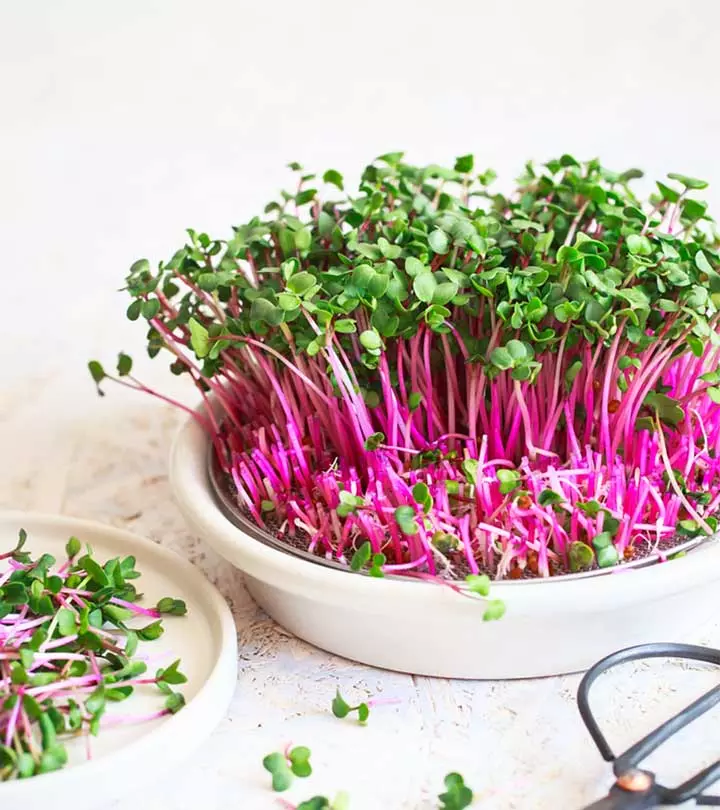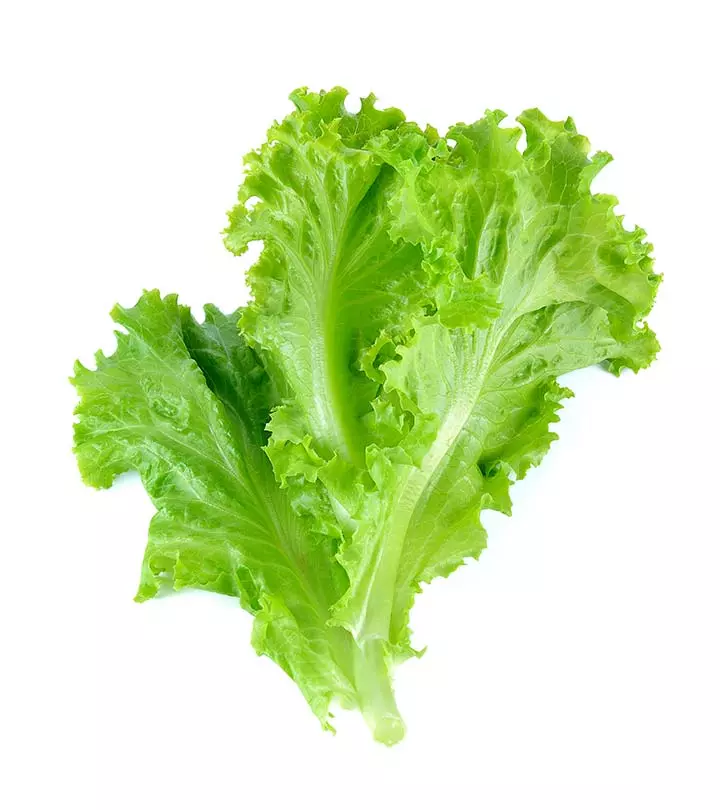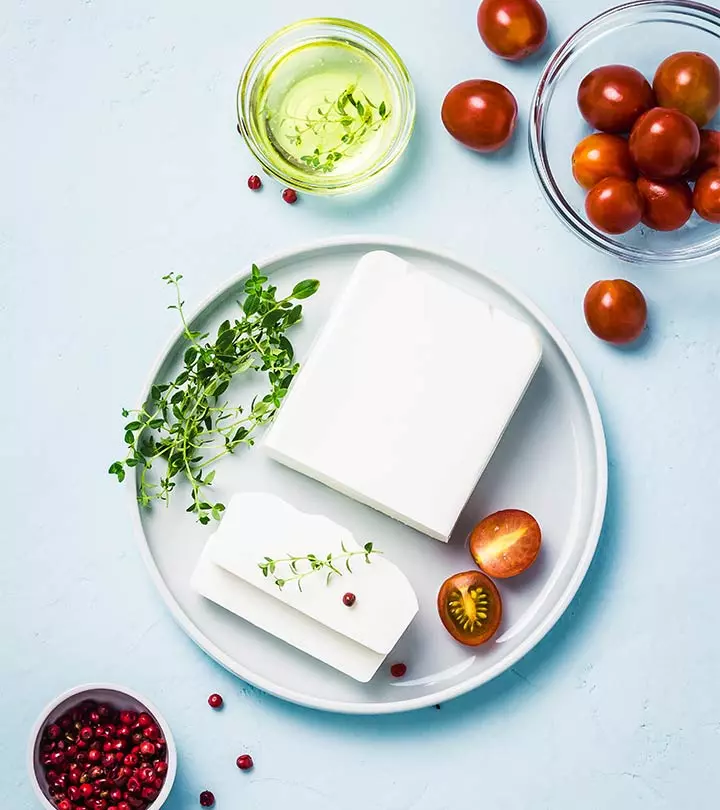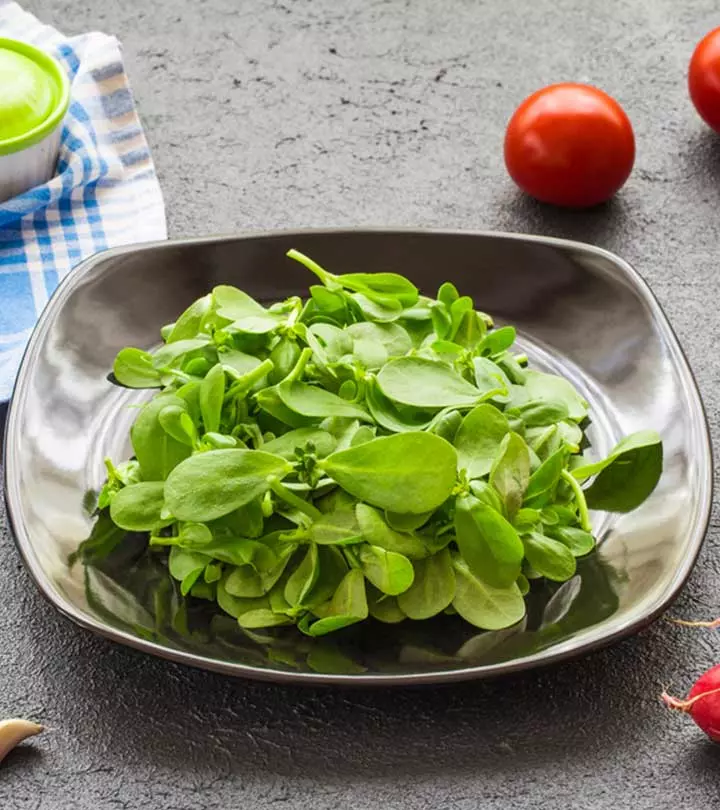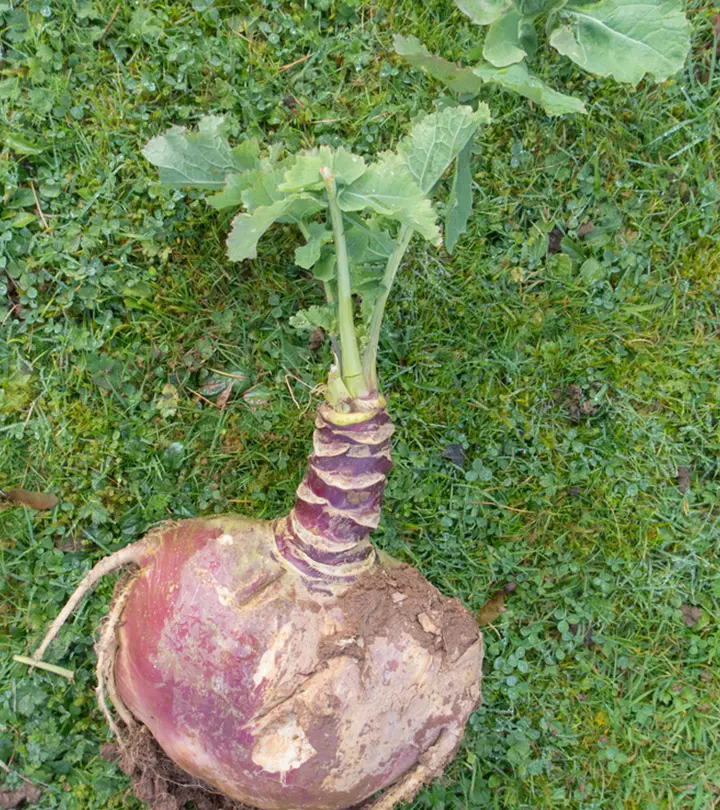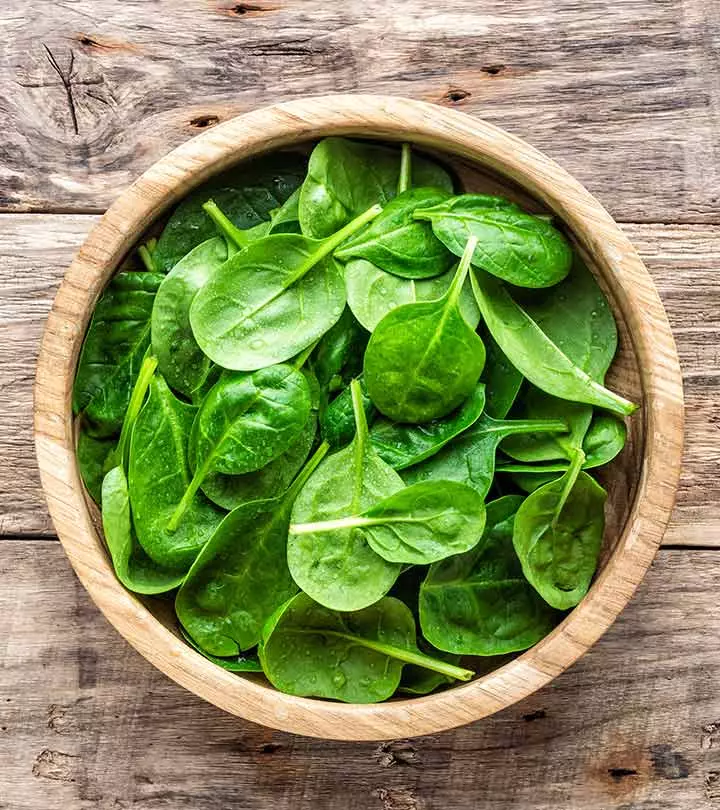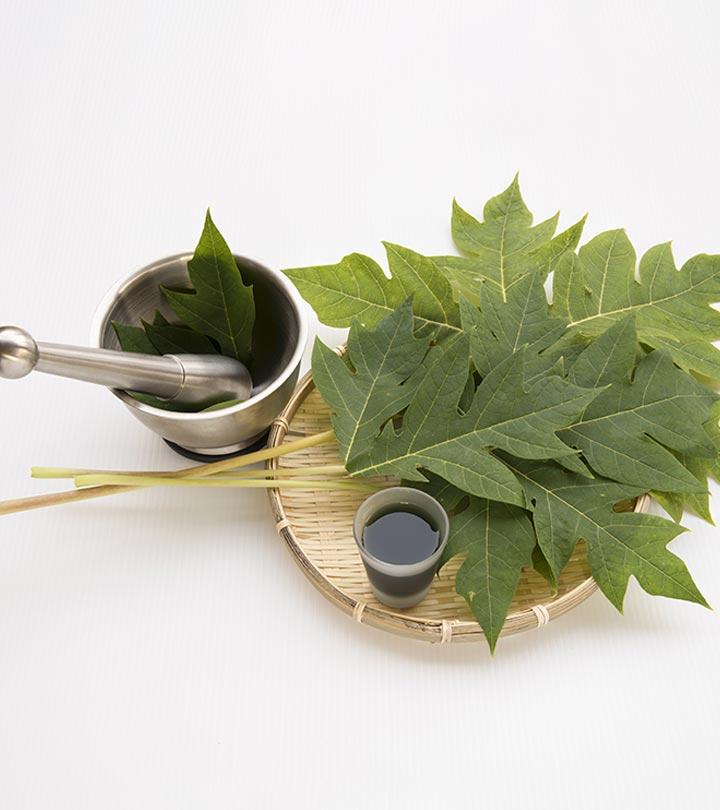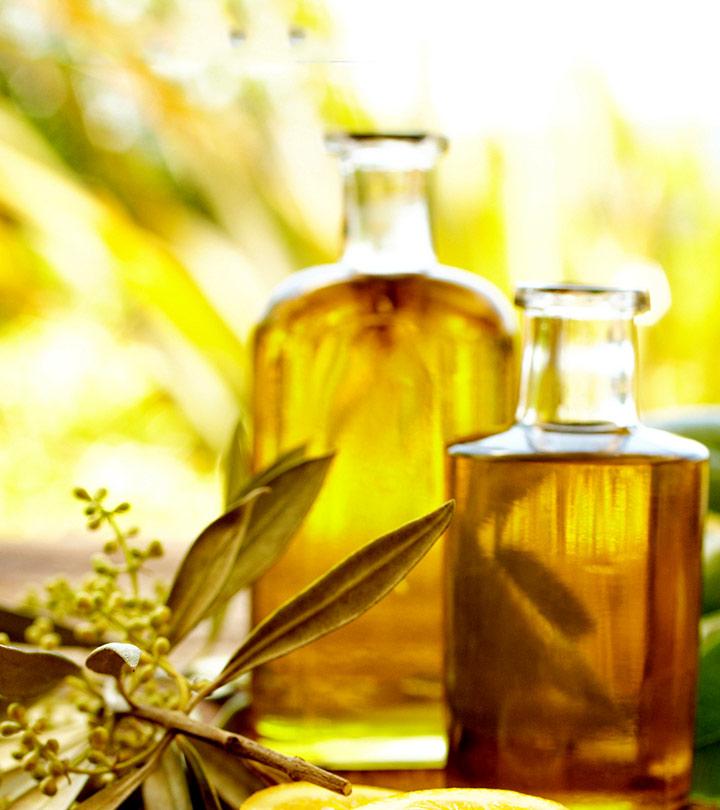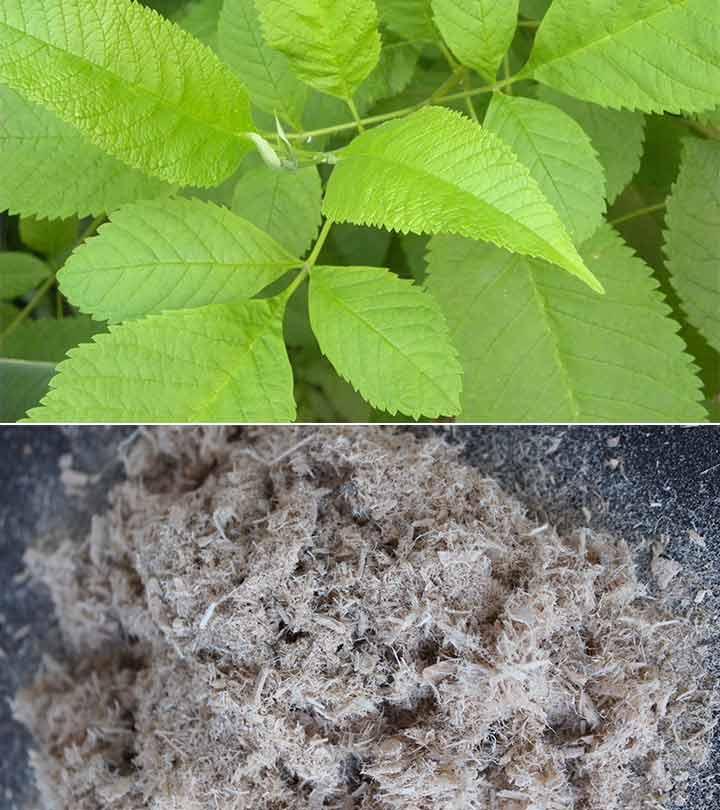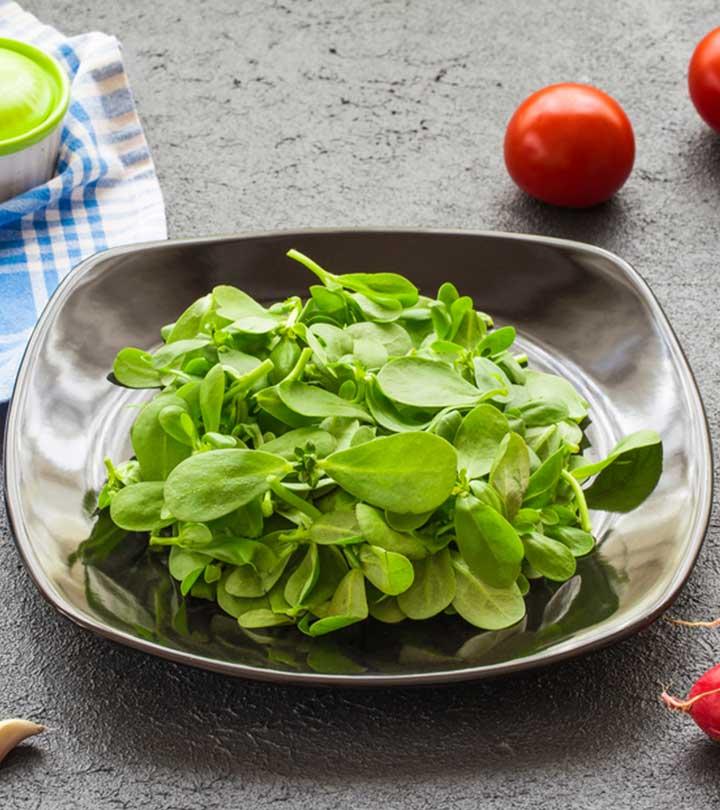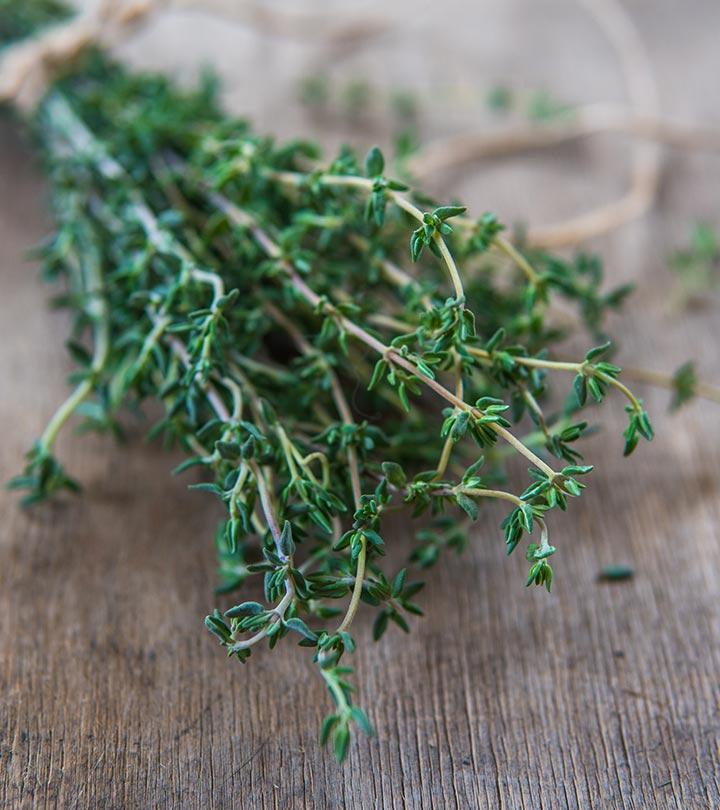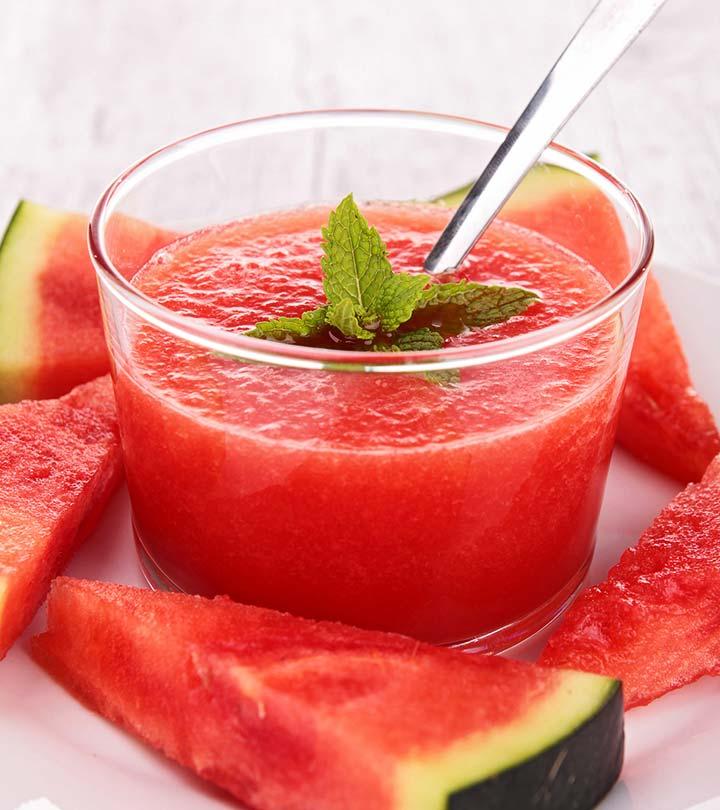Arugula Benefits, How To Use It, And Nutritional Facts
From improving your vision to reducing cancer risk – this herb benefits you in ways you never imagined.
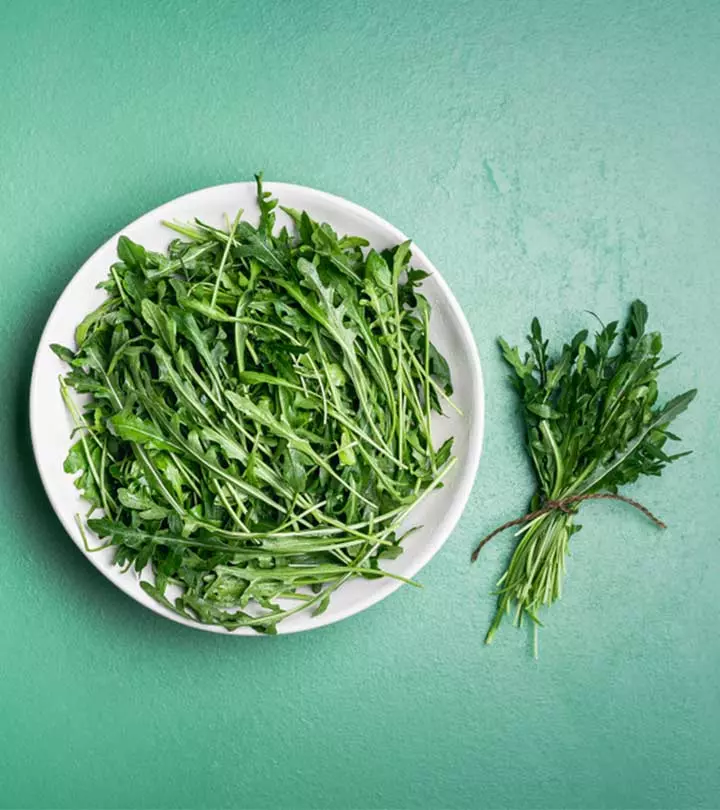
Image: Shutterstock
Arugula is an undiscovered treasure among other greens. The benefits of arugula range from improving eyesight to reducing cancer risk, yet its popularity lags behind other greens like broccoli, spinach, and kale. Arugula is often mistaken as lettuce. However, recently, it has been finding a niche as a “specialty green” due to modern research proving its health benefits. This article explains everything you need to know about this peppery, leafy green. Take a look.
In This Article
A Meeting With Arugula
Take a stroll around the garden in a Mediterranean country, and you may find a little green herb with deeply cut leaves, stems that are a gradient of green to purple, and tiny white flowers. Meet wild arugula or arugula rocket. You can pick it up and eat it just there. A refreshing hot peppery taste, quite similar to mustard, may linger on your mouth if you have caught it young. If it’s older, you may be taken aback by the hint of bitterness there. Now you know the answer to what arugula tastes like.
There are many varieties of this herb growing in the Brassicaceae family with more popular members like broccoli, kale, cauliflower, mustard, radish, and cabbage. Arugula has so many names that you may have a hard time keeping track of them, but the most common are eruca sativa (scientific name), rocket arugula, roquette (french), rucola, and Italian cress. This herbaceous plant that prefers sunny weather and a cool climate packs a super nutritious punch, with a wide array of phytochemicals, vitamins, and minerals. To top it off, arugula is low in fat, carbohydrates, and calories.
Arugula Nutrition Facts
Arugula Nutrition Facts | |
Phytochemicals (1) | flavonoids, phenolic acids, terpenes, carotenoids, tannins, glycosides, saponins, sterols, alkaloids |
Vitamins (2) | vitamin C, E, K, A, B-6, folates, niacin, riboflavin, thiamine, pyridoxine. |
Electrolytes And Minerals (3) | sodium, potassium, phosphorous, calcium, magnesium, iron, copper, manganese and zinc |
Carotenoids(2) | beta-carotene and lutein |
The richness of the nutritional content in arugula, and the presence of sulfur-containing secondary metabolites called glucosinolates translates to wonderful arugula benefits for health.
Let’s dive deeper into what arugula leaves, cooked and raw, can do for your body!
What Does Arugula Do For Your Health?
The health benefits of arugula are similar to those of other greens and veggies from the Brassica family because of its high concentrations of phytochemicals, antioxidants, essential minerals, and the presence of glucosinolates.
- Keeps The Bones And Teeth Strong
You can keep your bones and teeth in top condition with regular consumption of arugula. That’s because arugula contains high levels of calcium and vitamin K. Calcium is needed to form bones and teeth, whereas vitamin K serves as the glue that helps to deposit calcium and bind them together. A study conducted to understand the role of arugula in improving osteoporosis revealed that arugula may improve symptoms of osteoporosis, improve absorption of calcium and prevent bone impairment and damage (4, 12).
- Improves Vision And Maintains Eye Health
You may be at risk of developing cataracts and AMD (age-related macular degeneration which presents as blurry vision and progresses to near blindness over time). With arugula in your diet, you can lower the risks. A research review notes the importance of lutein, the main carotenoid in arugula, as an important component of maintaining vision and managing your eye health (5).
- May Provide Protection Against Cancer
You may have heard about the anti-cancer properties of kale, broccoli, and other brassicas. A number of studies have revealed that consumption of brassicas may lower the risk of lung cancer, colon cancer, stomach cancer, and rectal cancer most consistently. Further research is needed to understand how exactly it works, though. (6).
Arugula in particular is just as powerful and a handful of this crunchy green in your diet can bolster your body against different types of cancer. The glucosinolates in the arugula break down to form compounds called isothiocyanates. Erucin, the most important isothiocyanate from arugula, is being widely studied for its anti-cancer properties. So, how does it work? Research points towards different mechanisms like (7):
- Inhibiting the action of enzymes that activate carcinogens in the body.
- Introduction of enzymes that can detoxify the body of carcinogens.
- Inhibiting the multiplication of cancerous cells by stopping their cell cycle.
- Inducing cell death for malignant or premalignant cells in the body.
- Helps To Control Blood Pressure
Eating arugula may benefit your blood pressure. In a study conducted to find support for the traditional use of arugula as a hypertensive, researchers could prove its vasodilatory and cardiotonic effects. That means arugula can keep your heart pumping better to ensure smooth blood flow and also relax the blood vessels. The presence of erucin and flavonoids like quercetin supports this action of arugula. So, you can keep your blood vessels happy and stress-free with arugula in your diet (8).
- Safeguards Your Cardiovascular Health
Arugula benefits continue and serve you up more good news: you can reduce the risk of heart diseases with arugula on your plate. A study conducted to understand the antiplatelet aggregation and antithrombotic effects of arugula has provided evidence that arugula is a safer and more effective way to protect your heart. Arugula contains flavonoids like kaempferol, quercetin, and isorhamnetin which work to prevent thrombosis (blood clotting) in the vessels without the risk of inducing bleeding (9).
 Did You Know?
Did You Know?- Supports Your Immune System
Your immune system is your body’s best friend, fighting against all that may harm you from the outside in. But there’s a catch. When your body becomes a battleground, cytokinetic storms rage and that puts you in serious jeopardy. Arugula has been noted to have a suppressive effect on inflammatory cytokines. The result? Your immune system can function without getting itself too heated up and causing more harm than good to you. The credit goes to the antimicrobial properties of arugula as well as the flavonoids that it contains (10).
- Reduces Your Risk Of Developing Diabetes
Arugula is a great food for diabetics as it is extremely low in sugar and carbohydrates and rich in antioxidants. And it gets better, because one of the most important health benefits of arugula may be its role in reducing the risk of diabetes and even being a potential treatment for type-2 diabetes (11).
The antioxidant in arugula, known as alpha-linoleic acid (ALA), can improve insulin sensitivity, lower blood glucose levels and reduce oxidative stress related to diabetes which is often a precursor to major health issues (12).
- Protects Your Gut And Prevents Ulcers
Gastric urease, a compound produced by certain harmful bacteria can cause gastritis, stomach ulcers, and a host of other problems in the stomach. Arugula, a knight in shining armor, can inhibit the production of urease and successfully prevent or even treat stomach ulcers and protect the overall health of your gut. A study conducted to find supporting evidence for the traditional treatment of stomach ulcers with arugula has noted its tremendous role in preventing stomach ulcers and even stomach cancer (13).
You can get all these arugula benefits by making it a part of your healthy diet. So, let’s take a look at some of the best ways to use arugula.
How Can You Use Arugula Leaves?
You can get really creative with arugula in the kitchen. It’s truly a versatile green that adds a nice, flavorful kick.
- Mix It In Salads
Really, salads do not have to be boring. If you want just a green bowl, combine lettuce and arugula for a well-balanced combination of flavors. Drizzle with olive oil, a dash of lemon, and sprinkle a little salt and pepper. For more colorful salads, arugula combines well with citrus like oranges and cherry tomatoes, fruits like figs and watermelon, fish and chicken in salads. You can create your plate of color and enjoy the crispy, and distinctive flavor of arugula leaves.
- Throw It On As Toppings
In Italy, it has become a common practice to throw a fistful of fresh young arugula leaves on pizzas as soon as they come out of the oven! You can take inspiration from that and throw it on steaks, roasts, or baked stuff for an added layer of complexity for your palette. You can also top your wraps and sandwiches with arugula.
- Sass Up Your Seasoning Game
You can also chop up some fresh arugula and use it where you would traditionally use parsley or chives for a varied flavor profile.
- Stir It In Stir-fries
You don’t need to always have it raw. Cooked arugula is a little milder in flavor and works wonderfully in stir-fries and pasta dishes.
- Turn It Into A Dipping Sauce
Are you making fries or roasts and want a healthy dipping sauce on the side? Try arugula with basil (or solo) with mayonnaise/ greek yogurt for a herby, creamy, and yummy dip.
- Make Arugula Pesto
Not only basil, but arugula can do an excellent job as pesto. Use pine nuts and the usual ingredients and simply replace basil with arugula for a distinct pesto pasta that you’ll want to have again and again.
Colleen, a blogger, explains how she adds to the taste and value of a sandwich with arugula. She added, “I like arugula in general because of its rich peppery bitter taste. It is such a refreshing green leaf I dare to toss in any salad. I prefer baby arugula to full-size arugula. I use only baby arugula for my sandwiches, but it’s up to you (i).”
As long as you are not overcooking arugula, you are good to use it anyhow you want in salads, wraps, sandwiches, fries, sauces, and even gravies. It cooks really fast, so you don’t want it to wilt too much and turn bright green.
 Quick Tip
Quick TipIs arugula healthy? A big resounding yes. Is it tasty? Sure, it’s wonderful! So should I go on an arugula diet? Well, that’s a maybe. Let’s look at this consideration from various angles.
Arugula In Diet: How Safe Is It?
There are a few things to take into account before you go wild over wild rocket! There are no studies to suggest that arugula is bad for you. On the contrary, frequent consumption of arugula can provide a host of health benefits. But you need to follow certain precautions:
- If you are taking blood thinners, the vitamin K in arugula may interact negatively with the medication. Talk to your doctor about incorporating arugula into your diet.
- If you eat too much arugula, you may experience bloating and mild stomach discomfort. So, don’t think of fulfilling all your calorie needs with arugula.
Health enthusiasts consider arugula one of the healthiest green leafy vegetables. The benefits of arugula are attributed to its rich antioxidant profile and an array of vitamins, minerals, and beneficial phytonutrients like glucosinolates. Arugula may help promote vision, heart, and bone health. In addition, it reduces the risk of diabetes and cancer. You can reap the benefits of this veggie by adding it to your smoothies and salads, turning it into a dipping sauce, or using it as a topping. However, excess consumption may interfere with blood-thinning medications or lead to diarrhea. Hence, limit its consumption and seek medical advice if you experience any side effects.
Frequently Asked Questions
Which is healthier- spinach or arugula?
While both green leafy vegetables have a similar nutritional value, spinach has a slight edge as it is a better source of dietary fiber, vitamin C, and iron than arugula (14), (15).
Is arugula better cooked or raw?
According to anecdotal evidence, raw arugula offers a richer nutritional profile than when it’s cooked.
Is arugula healthier than kale?
No. Kale has higher amounts of macronutrients, such as proteins, dietary fiber, and vitamin C, than arugula (16).
Does arugula make you sleepy?
There is a lack of scientific evidence that suggests arugula has sedative properties.
Is arugula good for hair?
Possibly. Arugula is packed with vitamins and minerals that help promote hair growth and scalp health.
Is arugula good for your liver?
Possibly. A research study conducted on rats showed that the antioxidants present in arugula extracts have liver-protective properties (17).
Is arugula acidic or alkaline?
Arugula, like most leafy vegetables, have an alkaline pH.
Key Takeaways
- Arugula, also known as rocket arugula, is rich in vitamins A, B6, C, E, and K, calcium, iron, and essential minerals.
- Incorporating arugula in your meals can improve your bone and teeth, keep your blood pressure under control, and boost digestive health.
- However, consuming too much arugula may result in bloating and stomach discomfort.
Watch the following video to uncover the surprising health benefits of arugula, and explore the nutritional advantages and unique properties of this leafy green. Learn about why and how this green is a valuable addition to your diet.
Personal Experience: Source
(i) [Upgraded sandwich] Arugula – The easiest trick to add value to any sandwich
https://heavenlypalate.blogspot.com/2012/07/upgraded-sandwich-arugula-easiest-trick.html
References
Articles on StyleCraze are backed by verified information from peer-reviewed and academic research papers, reputed organizations, research institutions, and medical associations to ensure accuracy and relevance. Read our editorial policy to learn more.
- Eruca Sativa Linn.: Pharmacognostical and Pharmacological Properties and Pharmaceutical Preparations
https://innovareacademics.in/journals/index.php/ajpcr/article/view/30893 - Eruca Sativa (L.): Botanical Description Crop Improvement and Medicinal Properties
https://fdocuments.in/document/eruca-sativa-l-botanical-description-crop-improvement-and-medicinal.html - Mineral Content of the Rocket Plant (Eruca Sativa)
https://www.researchgate.net/publication/266369972_Mineral_content_of_the_rocket_plant_Eruca_sativa - Effect of Eruca Sativa Leaves Extract on Osteoporosis Induced by Phosphoric Acid in Adult Male Rabbits
https://www.researchgate.net/publication/325417540_Effect_of_Eruca_Sativa_Leaves_Extract_on_osteoporosis_induced_by_phosphoric_acid_in_adult_male_rabbits - Dietary Sources of Lutein and Zeaxanthin Carotenoids and Their Role in Eye Health
https://www.ncbi.nlm.nih.gov/pmc/articles/PMC3705341/ - Epidemiological Studies on Brassica Vegetables and Cancer Risk
https://pubmed.ncbi.nlm.nih.gov/8877066/ - Erucin the Major Isothiocyanate in Arugula (Eruca sativa) Inhibits Proliferation of MCF7 Tumor Cells by Suppressing Microtubule Dynamics
https://www.ncbi.nlm.nih.gov/pmc/articles/PMC4065051/ - Antihypertensive Effect of the Methanolic Extract from Eruca Sativa Mill. (Brassicaceae) in Rats: Muscarinic Receptor-Linked Vasorelaxant and Cardiotonic Effects
https://www.researchgate.net/publication/325847623_Antihypertensive_effect_of_the_methanolic_extract_from_Eruca_sativa_Mill_Brassicaceae_in_rats_Muscarinic_receptor-linked_vasorelaxant_and_cardiotonic_effects - A Novel Role of Eruca sativa Mill. (Rocket) Extract: Antiplatelet (NF-κB Inhibition) and Antithrombotic Activities
https://www.mdpi.com/2072-6643/6/12/5839/htm - Eruca sativa and its Flavonoid Components Quercetin and Isorhamnetin Improve Skin Barrier Function by Activation of Peroxisome Proliferator-Activated Receptor (PPAR)-α and Suppression of Inflammatory Cytokines
https://onlinelibrary.wiley.com/doi/10.1002/ptr.5138 - The Fatty Acid-rich Fraction of Eruca Sativa (Rocket Salad) Leaf Extract Exerts Antidiabetic Effects in Cultured Skeletal Muscle Adipocytes and Liver Cells
https://www.ncbi.nlm.nih.gov/pmc/articles/PMC6130626/ - Arugula (Eruca Vesicaria Subsp. Sativa (Miller) Thell.): A Healthy Leafy Vegetable
https://www.researchgate.net/publication/337592972_Arugula_Eruca_vesicaria_subsp_sativa_Miller_Thell_A_healthy_leafy_vegetable - Antiulcer Effect of Extract/Fractions of Eruca sativa: Attenuation of Urease Activity
https://pubmed.ncbi.nlm.nih.gov/24647097/ - SPINACH
https://fdc.nal.usda.gov/fdc-app.html#/food-details/729422/nutrients - HISTORICAL RECORD]: ORGANIC BABY ARUGULA
https://fdc.nal.usda.gov/fdc-app.html#/food-details/554607/nutrients - [HISTORICAL RECORD]: BABY KALE
https://fdc.nal.usda.gov/fdc-app.html#/food-details/774844/nutrients - Carbon tetrachloride-induced hepatotoxicity: Protective effect of ‘Rocket’ Eruca sativa L. in rats
https://pubmed.ncbi.nlm.nih.gov/20128046/
Read full bio of Joseph Moore
Read full bio of Ravi Teja Tadimalla
Read full bio of Himanshi Mahajan





